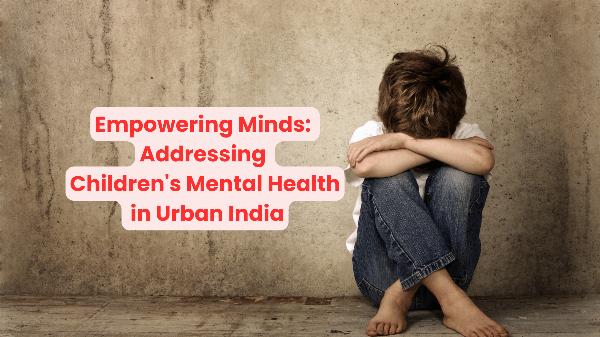Tackling the Mental Health Crisis Among Urban Children in India

Strong 8k brings an ultra-HD IPTV experience to your living room and your pocket.
Introduction
Urbanization in India has led to a rapid transformation in lifestyle, education, and social dynamics. However, this shift has also brought with it significant challenges, particularly concerning the mental health of children growing up in these bustling cities. As the pressures and complexities of urban life increase, so too do the mental health issues faced by young children. This article explores the growing mental health crisis among urban children in India, highlighting the urgent need for intervention, awareness, and comprehensive support systems.
Rising Mental Health Issues in Urban India
The mental health of children in urban India is becoming a matter of increasing concern. Recent studies suggest that around 12-15% of urban children are experiencing psychological distress, a statistic that reflects the broader societal pressures that these children face. Anxiety disorders, depression, ADHD, and behavioral issues are becoming more prevalent, driven by the unique stresses of urban environments.
Contributing Factors to the Mental Health Crisis
Several factors contribute to the rise in mental health problems among urban children in India. One of the primary factors is academic pressure. In urban areas, the emphasis on academic achievement is intense, with children often facing overwhelming expectations from parents, teachers, and society at large. This pressure can lead to chronic stress, anxiety, and even depression, severely affecting a child’s overall well-being.
Family dynamics also play a crucial role in this crisis. The typical urban family structure often involves nuclear families with both parents working, leaving children with limited emotional support at home. This lack of a nurturing environment can exacerbate feelings of loneliness, isolation, and neglect, which can contribute to the development of mental health issues.
Social media has emerged as another significant factor in the mental health challenges faced by urban children. The pervasive influence of social media exposes children to unrealistic expectations and cyberbullying, both of which can severely impact their self-esteem and mental health. The constant comparison to peers online can lead to feelings of inadequacy and depression.
Additionally, the urban environment itself contributes to mental health problems. The constant noise, pollution, and lack of green spaces in cities create a stressful environment that can negatively impact children’s mental well-being. The absence of safe and accessible recreational spaces means that children have fewer opportunities to relax and engage in physical activities, further exacerbating their mental health challenges.
Recognizing Mental Health Issues in Children
Recognizing the signs of mental health issues in children is crucial for early intervention. Emotional symptoms such as persistent sadness, irritability, and excessive worry are often the first indicators that a child may be struggling with mental health problems. These symptoms can start subtly but tend to intensify if left unaddressed.
Behavioral changes, such as withdrawal from social interactions, declining academic performance, and uncharacteristic aggression or defiance, are also key signs that a child may be facing mental health challenges. Parents, teachers, and caregivers should be vigilant for these changes, as they often indicate underlying psychological distress.
Physical symptoms, although sometimes overlooked, can also be manifestations of mental health issues. Recurrent headaches, stomachaches, and sleep disturbances are common physical complaints that may have psychological roots. When these symptoms persist without a clear physical cause, it is essential to consider mental health as a possible factor.
The Importance of Parental and Educational Support
Parents and educators play a vital role in addressing and supporting children’s mental health. For parents, maintaining open communication with their children is essential. By fostering a supportive and understanding home environment, parents can help children feel safe in expressing their emotions and concerns. Being attuned to their child’s mood, behavior, and physical health can also help parents identify potential mental health issues early on.
Educators are equally important in supporting children’s mental health. Teachers interact with children on a daily basis and are often the first to notice changes in behavior or academic performance. Educators can play a critical role in early detection and intervention by creating a supportive classroom environment, recognizing signs of distress, and providing necessary support. Training for teachers to identify and respond to mental health issues is essential for promoting a positive and inclusive school environment.
Breaking the Stigma and Raising Awareness
One of the biggest challenges in addressing mental health issues among children is the stigma surrounding mental illness. In many parts of India, mental health remains a taboo subject, and this stigma often prevents open discussions about mental health and discourages people from seeking help. Breaking this stigma is crucial for creating a society where mental health is taken seriously and where children feel comfortable seeking the help they need.
Raising awareness about mental health through educational campaigns, workshops, and community programs can help break down the barriers associated with mental health. Promoting a better understanding of mental health issues and the importance of early intervention can lead to a more supportive and proactive approach to children’s mental well-being.
Strengthening Mental Health Support Systems
Access to mental health resources is vital for children dealing with psychological distress. Counseling and therapy services can provide essential support, helping children develop coping strategies and navigate their challenges effectively. Community programs that focus on mental health education, recreational activities, and peer support are also crucial in building a strong support system for children and their families.
Government initiatives aimed at improving mental health services in schools and communities are steps in the right direction. However, these efforts need to be expanded and better integrated into existing structures to ensure they reach all children who need them.
Conclusion: A Collective Effort is Needed
The mental health crisis among urban children in India is a complex issue that requires a comprehensive and coordinated response. Parents, educators, healthcare providers, and policymakers all have a role to play in addressing this crisis. By recognizing the early signs of mental distress, understanding the contributing factors, and building robust support systems, we can create an environment where every child has the opportunity to thrive emotionally and mentally. Addressing children’s mental health is not just necessary—it is our collective responsibility to ensure the well-being of the next generation.
Note: IndiBlogHub features both user-submitted and editorial content. We do not verify third-party contributions. Read our Disclaimer and Privacy Policyfor details.



